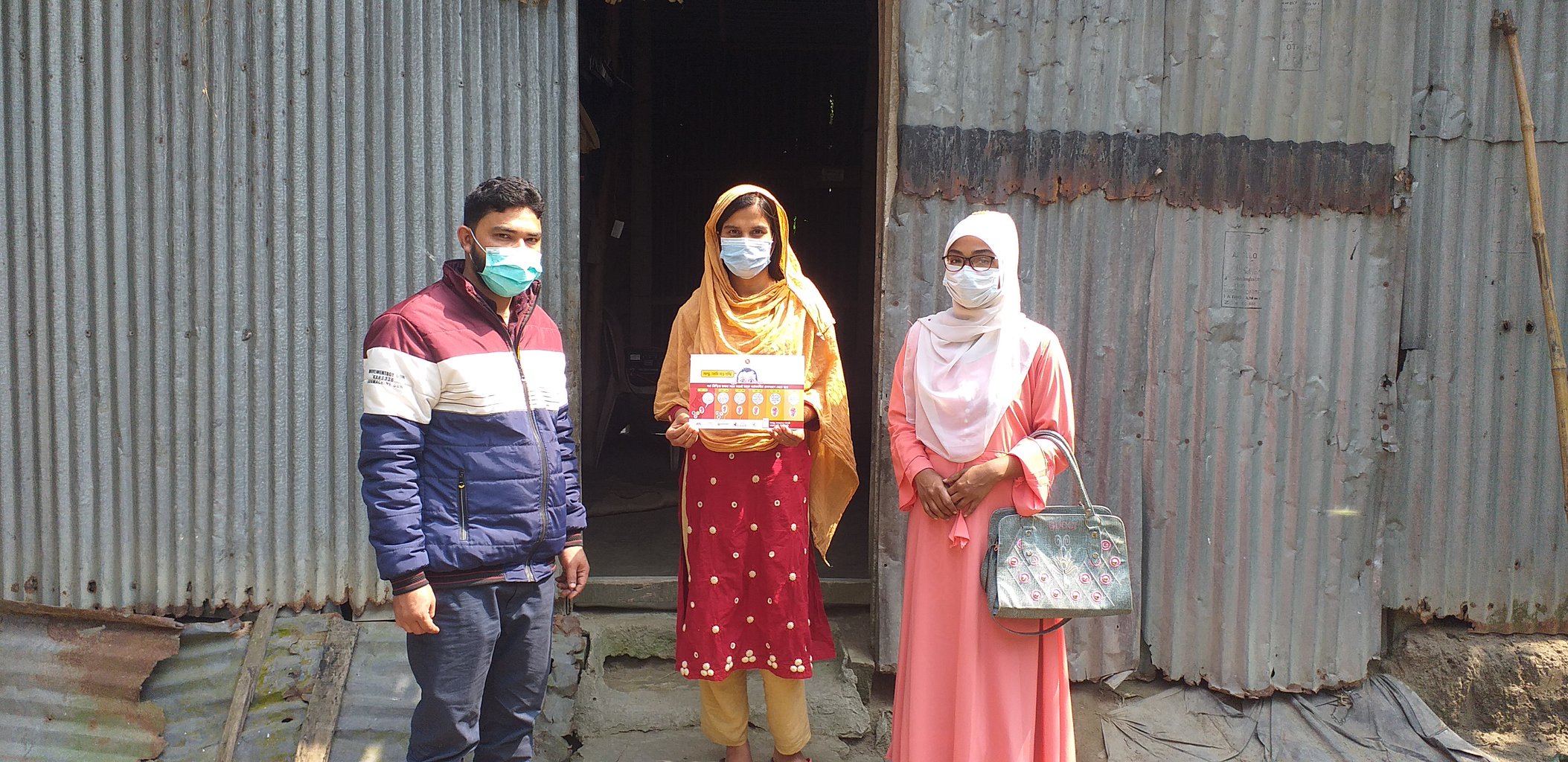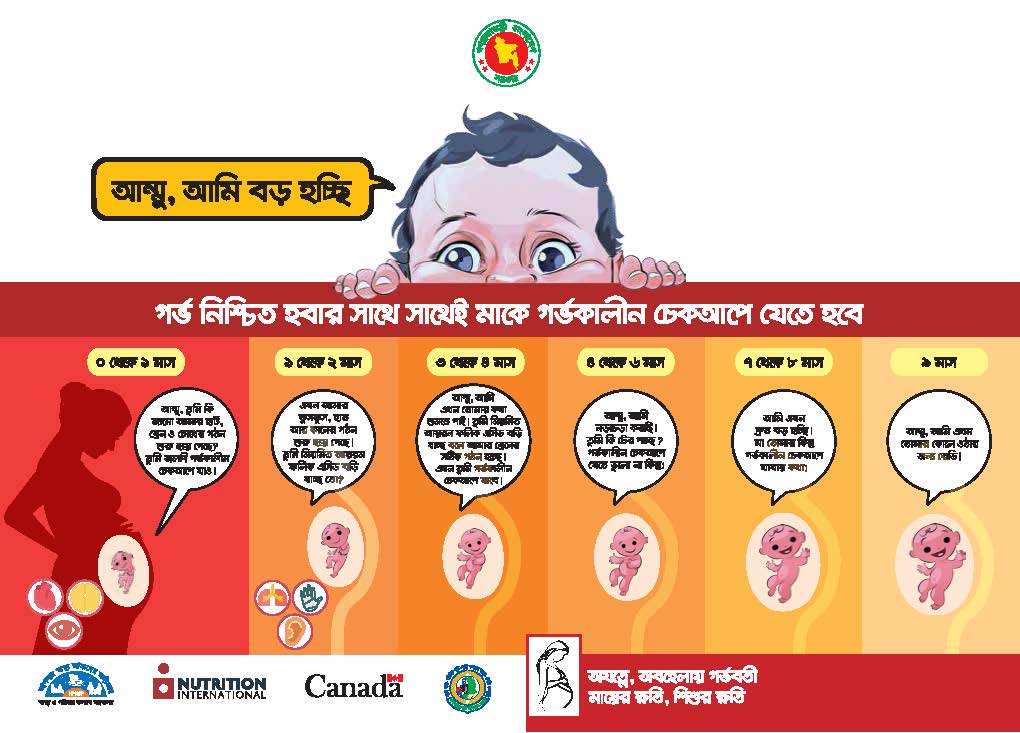Field Stories
WATCH: The power of adolescent nutrition programming
May 15, 2024
Access to quality maternal health and nutrition services is not a privilege – it’s a necessity.
Learn from Moushumi Akter, a pregnant woman from Bangladesh who has endured a difficult journey with pregnancy and childbirth. Find out how better access to quality maternal community health and nutrition services has helped transform her path.
Posted on June 13, 2022
Twenty-five-year-old Moushumi Akter is in the last trimester of her third pregnancy. She is hoping that, unlike her first two, this one will result in the birth of a healthy baby. Her first pregnancies took place early in the COVID-19 pandemic, when in-person antenatal care services were difficult to access, and her family faced added financial strain from lockdown conditions and loss of income. She also wasn’t aware of the increased nutritional needs of her body while pregnant. As she nears her due date, Moushumi is grateful that this experience has been different.
Access to quality maternal health services is a foundational necessity for both pregnant women and infants. As a long-time trusted partner of the National Nutrition Service under the Institute of Public Health Nutrition in Bangladesh (IPHN), Nutrition International provides technical and operational assistance to support a positive pregnancy for women and their families. This assistance includes developing nutrition action plans, trainings for community health centres and frontline workers, supporting supply chain management of essential nutrition commodities, behaviour change initiatives to increase uptake and utilization of services, and monitoring of key indicators. All this helps to ensure pregnant women have access to quality maternal health and nutrition services such as antenatal care and iron and folic acid (IFA) supplementation.

In 2021, Nutrition International launched the COVID-19 Emergency Nutrition Response Project to scale-up essential nutrition services, particularly for women and children who were impacted by the pandemic. Samia Alam, Nutrition International’s Project Officer for the emergency response in Bangladesh, discusses the dangers associated with receiving no form of antenatal care. “It will not be possible to identify if the pregnant woman is anaemic, if her blood pressure is under control, if she is gaining weight properly, or if there are any other risks of preeclampsia, hypertension, or bleeding during pregnancy,” she says. “The woman and her family also won’t be aware of the five danger signs to watch out for during pregnancy that could lead to maternal and infant death.”
In September 2021, as part of the project, support services were launched in the Jamalpur and Sherpur districts of Bangladesh, which have some of the highest malnutrition rates in the country. The program was designed to help ensure that pregnant women in both districts saw their local community healthcare workers at least four times throughout their pregnancies so they could receive antenatal care counselling and a recommended supply of IFA tablets, alongside other antenatal care recommendations.
Moushumi heard about the program from a relative who had been receiving antenatal care and IFA supplementation. After learning that she had not received these services during her first two pregnancies, her relative encouraged her to visit the health facility. She also brought Moushumi along to the weekly courtyard sessions on her block, where health assistants and family welfare assistants provide health education to pregnant women and their families. This information and guidance convinced Moushumi to seek the necessary maternal health services at the local health facility.
After learning that she had not received these services during her first two pregnancies, her relative encouraged her to visit the health facility.
Since the start of the pandemic, it’s been a global challenge to get pregnant women like Moushumi to continue accessing maternal health services. Nutrition International and the IPHN identified a fear of contracting COVID-19, shared by both patients and community health practitioners, as a barrier to seeking and receiving antenatal care. “Service providers were afraid during the COVID-19 lockdown period,” says Krishna Paul, Nutrition International’s Emergency Response Grant District Coordinator for Sherpur. “They only provided medicines instead of in-person physical checkups. This also made it difficult for pregnant women to access antenatal services from health facilities before the start of this project.”
Nevertheless, the importance of maternal and prenatal health was a challenge that couldn’t be shied away from. The problem was tackled using a two-pronged approach.
To ensure pregnant women continued to visit the health facility, they were given a short-ended supply of 30 IFA supplementation tablets during each antenatal counselling visit with their community healthcare provider. Once they ran out, they would return to collect their next 30-day supply and follow up on their antenatal counselling for a minimum of four sessions.

To address COVID-19 safety and a fear of in-person contact, pregnant women were also given behaviour change materials developed by Nutrition International to be taken home. These pocket-sized pamphlets contained valuable information about looking out for specific danger signs, nutritional needs for each stage of pregnancy, an IFA supplementation guide, and the timing of their next check-ups – as well as messages for spouses, encouraging them to be active participants in antenatal care. They were designed to provide pregnant women and their spouses with necessary information and help them feel less anxious about needing frequent visits to their healthcare provider.
Moushumi expresses that her knowledge, confidence and awareness of her body’s evolving needs have grown since having access to regular counselling sessions and the informative pamphlets. She says the nutritional infographic named “Ammu Ami Boro Hocchi” (Mom, I’m growing up) has been especially helpful in understanding the different stages of pregnancy.
After reflecting on her past pregnancies, Moushumi is now outwardly grateful to her supportive healthcare practitioners that have held her hand throughout this transformational journey. She is dedicated to following all the counselling guidelines and recommendations from her medical team. Moushumi has made it a personal goal to share her profound experience with other soon-to-be-mothers, neighbours and close relatives. With a due date quickly approaching, Moushumi reminds herself of the message she’s been waiting to hear for two years: Ammu Ami Boro Hocchi.